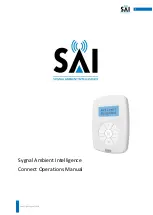
2
7
6
12
10
2
9
20
21
5
8
14
16
4
13
1
3
11
19
17
18
15
KEYSTONE
FIGURE 952 KNIFE GATE VALVES
INSTALLATION AND OPERATING MANUAL
ASSEMBLY PROCEDURE
1. With bevelled edge (Not applicable on
polyurethane trim valves) of gate up stream
and away from the seating face, place gland
box/gate sub-assembly into body and push
gate down until firmly wedged at bottom of
valve.
2. Screw the gland box nuts (10) onto each
pillar (9), add washers (11) and (12). Coat
threads with anti-seize compound. Put each
pillar sub-assembly through gland box holes
and screw them into the valve body lug until
pillar is level with the bottom of the body lug.
Height of pillars (9) should be equal.
NOTE
For Polyurethane trimed valves ignore steps
3 through 5.
3. Screw in the gate guides (13) until they
contact the gate, do not over tighten.
4. With gate firmly wedged into bottom of
valve, push top of gate towards downstream
side to ensure it’s firmly up against seat (4),
then tighten pillar nuts.
5. Check gate alignment (gate closed).
If correctly fitted and aligned
• Gate will be fitting firmly and evenly up
against seating face in valve body.
• Gate and gland box will be approximately
centred with the valve body viewed from
front and sides.
• Gate will be true and parallel to valve body
axis viewed from the side.
• Gate will not have significant movement
when rocked backwards and forwards
(upstream and downstream, not sideways).
Note:
DN 50 - 200 (NPS 2 - 8) valve illustrated.
If not fitted correctly
• Gate is not seating properly into the wedges
in the base of the valve and/or the gate guides
in the upper body of the valve are badly worn,
missing or incorrectly adjusted - repair as
necessary.
6. Fit bridge sub-assembly (handwheel,
handwheel nut, spindle and bridge or
cylinder actuator and bridge) to the top of the
pillars and secure using bridge bolts (14).
7. To fit the clevis pin (19) adjust the spindle (5)
until the holes in the spindle and the gate
are aligned.
8. Assembly is complete, actuate to check all
is functioning as desired and gate reseats
itself into the wedges at bottom of the valve
body. If re-seating does not occur, loosen
gland box nuts (8) and remove gland box,
clean and repeat steps.
NOTE
1. At commissioning or plant start-up, open
and close valve to check it is operating
correctly - gland nuts (8) may require adjustment.
Please ensure to tighten equally.
2. To minimize risk to personnel, Emerson
recommend the use of purpose built guards
and shrouds. Refer to the Emerson data sheet
or consult factory for details.
CAUTION
Do NOT over tighten gland packing as it will cause
excessive resistance to gate movement.
Neither Emerson, Emerson Automation Solutions, nor any of their affiliated entities assumes responsibility for the selection, use or maintenance of any product.
Responsibility for proper selection, use, and maintenance of any product remains solely with the purchaser and end user.
Keystone is a mark owned by one of the companies in the Emerson Automation Solutions business unit of Emerson Electric Co. Emerson Automation Solutions, Emerson
and the Emerson logo are trademarks and service marks of Emerson Electric Co. All other marks are the property of their respective owners.
The contents of this publication are presented for informational purposes only, and while every effort has been made to ensure their accuracy, they are not to be
construed as warranties or guarantees, express or implied, regarding the products or services described herein or their use or applicability. All sales are governed by
our terms and conditions, which are available upon request. We reserve the right to modify or improve the designs or specifications of such products at any time without
notice.
Emerson.com/FinalControl




















